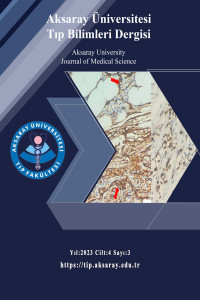Abstract
Tip 2 DM hastaları için hazırlanmış iyi bir beslenme planı kan glikoz seviyelerini normal düzeylerde tutmaları için önemlidir. Diyabet hastaları için önerilen ketojenik diyet (KD), son yıllarda popüler olan, yüksek oranda yağ, düşük karbonhidrat ve orta düzeyde protein içeren ve bilimsel temelleri olan bir diyettir. Diyabetin etiyolojisinde yer alan sağlıksız beslenme ve obezite sorunu göz önüne alındığında KD’nin diyabet hastalarında kullanılabilirliği araştırmacıların merakını uyandırmıştır. Açlığın fizyolojik durumunu taklit eden KD ile vücutta yeterli karbonhidrat bulunmadığı için diyetle alınan yağlar veya depo yağlar, önce yağ asitlerine ve ardından keton cisimlerine dönüşerek beslenme ketozisi oluşturulur. Keton cisimleri beyin de dahil olmak üzere vücutta enerji kaynağı olarak kullanılır. Böylece kan glikoz düzeyi ve insülin salınımı kontrol altına alınabilir. Keton cisimlerinin enerji kaynağı olarak kullanılmasının yanı sıra, sinyal molekülü özellikleri ile vücutta birçok işleve sahiptir. KD modelinin kilit yönü, karbonhidratların 50 gr/günlük’den daha az alımının sağlanması ve hastaları nutrisyonel ketoziste tutmaktır. Günümüzde KD’nin diyabet hastalarında kilo verme, glikoz ve lipid metabolizması üzerinde olumlu etkilerinin olduğu gösterilmiştir. Diğer taraftan diyabette ketozisin hastalar için güvenli olup olmadı noktasında fikir ayrılıkları bulunmaktadır. Bu derleme çalışmanın amacı KD’nin Tip 2 DM patogenezinde ve yönetiminde olası rolünü ve etkilerini araştırmaktır.
References
- Walton CM, Perry K, Hart RH, Berry SL, Bikman BT. Improvement in Glycemic and Lipid Profiles in Type 2 Diabetics with a 90-Day Ketogenic Diet. J. Diabetes Res. 2019; 14:8681959.
Abstract
A good nutrition plan for people with type 2 DM is important to maintain normal blood glucose levels. The ketogenic diet (KD), which is recommended for diabetic patients, is a scientifically based diet with high fat, low carbohydrate and moderate protein content that has become popular in recent years. Considering the problem of unhealthy diet and obesity in the etiology of diabetes, the usability of the KD in diabetic patients has aroused the curiosity of researchers. With the KD, which mimics the physiological state of hunger, dietary fats or stored fats, which are taken in the diet due to the lack of sufficient carbohydrates in the body, are first converted into fatty acids and then into ketone bodies, creating nutritional ketosis. Ketone bodies are used as an energy source in the body, including the brain. Thus, blood glucose levels and insulin release can be controlled. In addition to being used as an energy source, ketone bodies have many functions in the body with signaling molecule properties. The key aspect of the KD model is to maintain patients in nutritional ketosis with carbohydrate intake less than 50 g/day. Currently, KD has been shown to have positive effects on weight loss, glucose and lipid metabolism in diabetic patients. On the other hand, there is disagreement as to whether ketosis in diabetes is safe for patients. The aim of this review study is to investigate the possible role and effects of KD in the pathogenesis and management of Type 2 DM.
References
- Walton CM, Perry K, Hart RH, Berry SL, Bikman BT. Improvement in Glycemic and Lipid Profiles in Type 2 Diabetics with a 90-Day Ketogenic Diet. J. Diabetes Res. 2019; 14:8681959.
Details
| Primary Language | Turkish |
|---|---|
| Subjects | Clinical Sciences |
| Journal Section | Research Articles |
| Authors | |
| Publication Date | January 26, 2024 |
| Submission Date | March 10, 2023 |
| Acceptance Date | August 3, 2023 |
| Published in Issue | Year 2024 Volume: 4 Issue: 3 |


